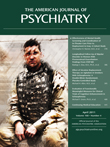To the Editor: We report a case of drug-resistant major depression due to left carotid artery stenosis, with rapid and full recovery following carotid endarterectomy.
A 74-year-old man living by himself, without any personal or familial psychiatric history, was admitted to our psychiatry department for drug-resistant major depression despite successive treatments with sertraline, clomipramine, and moclobemide over 3 years; a previous psychiatric hospitalization; and current treatment with imipramine (appropriate dosages and durations). He presented significant sadness, anxiety, sense of failure, loss of interest, anhedonia, concentration difficulties, indecision, suicidal ideas, asthenia, decreased appetite, decreased weight, and social withdrawal. He scored 21 on the Hamilton Depression Rating Scale (HAM-D) and 30 on the Mini-Mental State Examination.
The patient had cardiovascular risk factors: past smoking, hypercholesterolemia, and long-standing hypertension treated with atenolol. Findings on his physical examination and blood serum screening (including thyroid hormones, vitamin B12, and folates) were normal. No audible carotid bruit was present. A systematic cerebral contrast MRI evidenced neither leukoaraiosis nor recent lesion on diffusion-weighted imaging sequences but showed a small silent infarct in the left parietal region on FLAIR sequences at the junction between the left anterior and middle cerebral arteries. Carotid Doppler ultrasonography showed internal carotid artery stenosis bilaterally with significant luminal narrowing (left: 90%, right: 40%). A four-vessel cerebral angiogram confirmed the left subocclusive carotid artery stenosis.
After withdrawing antidepressant and starting aspirin and atorvastatin, the patient underwent an emergency left carotid endarterectomy under local anesthesia.
A dramatic improvement in depressive symptoms was observed within 4 days after the procedure, especially in anxiety and loss of interest. After 1 week, the patient's HAM-D score was 5. No depressive relapse had occurred 8 weeks later.
A mood disorder due to a general medical condition (carotid artery stenosis) with major depressive-like episode was diagnosed.
Even if age and an asymptomatic left parietal infarct could be considered predisposing factors for depression (
1), three factors suggest that major depression was related to severe carotid artery stenosis in this case: no familial or personal psychiatric history, full recovery within 4 days of carotid endarterectomy (a time course atypical for recovery from idiopathic major depression), and absence of relapse 8 weeks after carotid endarterectomy. Moreover, carotid artery stenosis has been associated with depressive symptoms and suicide in two previous case reports, even in the absence of cerebral infarction (
2,
3), and cerebral hypoperfusion was the suspected underlying mechanism. Indeed, our report is consistent with a previous case showing a positive effect of carotid endarterectomy on major depression (
2).
Consequently, in patients with cardiovascular risk factors, and even if carotid bruit is not present, drug-resistant major depression requires systematic carotid Doppler ultrasonography as early as possible to screen for carotid artery stenosis, since carotid endarterectomy can produce rapid and full recovery of carotid artery stenosis-related drug-resistant major depression.

